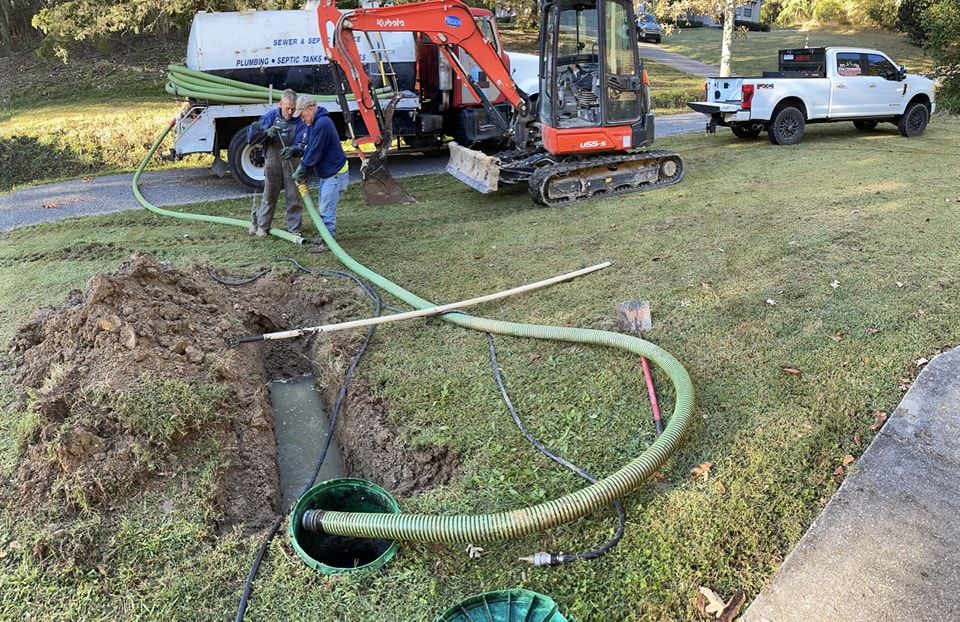Septic Tank Maintenance & Field Line Repair
in Chattanooga, TN
Septic Tank Experts
To maintain a healthy and efficient septic system, regular pumping is crucial. Over time, sludge and waste accumulate, risking backups and reducing the tank’s capacity. Typically, septic tanks should be pumped every 3 to 5 years, though this may vary depending on factors like household size, water usage, and tank dimensions—larger households or higher usage often require more frequent service. Our skilled technicians use advanced equipment to thoroughly clean your tank, helping to prevent costly repairs and extend its lifespan.
Ready to schedule your septic tank pumping or need emergency service? Contact us today!
Request an Estimate
24/7 Emergency Septic Pumping
Septic system emergencies can strike unexpectedly, causing significant disruption to your property. That’s why our team is on standby 24/7 to address urgent issues, including system backups, leaks, and other malfunctions. Our swift response minimizes damage, restores functionality, and ensures peace of mind when you need it most.
Our Process
At Chattanooga Septic, we take pride in offering professional and efficient septic pumping services. Our process begins with locating your septic tank and determining accessibility. If the tank lid is buried and needs uncovering, we offer excavation services to remove the dirt surrounding the tank, ensuring safe access for pumping. This step may require the use of an excavator, depending on the depth and amount of soil covering the tank. Please note that additional charges apply for excavation work, as it involves extra time and equipment. Once the tank is uncovered, our team uses state-of-the-art equipment to thoroughly pump and clean the septic system, leaving it functioning optimally. For a hassle-free experience, we recommend ensuring the tank is exposed before our arrival or discussing excavation needs during scheduling.
Field Line Repair
Sometimes, homeowners may believe their septic tank needs pumping when the actual issue lies with their field lines. Field lines, or drain lines, are responsible for dispersing liquid waste into the surrounding soil after it exits the septic tank. When these lines become clogged, damaged, or saturated, the system can back up, mimicking the symptoms of a full tank. Pumping the tank in this situation may provide temporary relief but won’t resolve the root cause. Common signs of field line problems include slow drains, wet or soggy areas in the yard near the septic system, or persistent odors. If these issues arise, it’s essential to have a professional inspect the entire system to determine whether the field lines need repair or replacement.
Septic Tank Pumping Services
Septic Tank Pumping
Regular septic tank pumping is vital to maintaining a healthy and efficient septic system. Over time, sludge and solid waste accumulate in the tank, reducing its capacity and potentially causing system backups or failures. Our skilled technicians utilize advanced equipment to thoroughly remove waste, ensuring your tank operates at its best. Routine pumping not only prevents costly repairs but also extends the lifespan of your septic system. It is typically recommended that a septic tank be pumped every 3 to 5 years, although this frequency can change based on factors such as the size of the household, water consumption habits, and the tank's dimensions; larger households and higher water usage may necessitate more frequent pumping.
Septic System Inspection
Comprehensive septic system inspections are essential for early detection of potential problems. Our experts meticulously evaluate your system, checking for signs of wear, leaks, or blockages. Following the inspection, we provide a detailed report with actionable recommendations to address any concerns. Proactive inspections can save you time, money, and stress by preventing small issues from escalating into major repairs.

